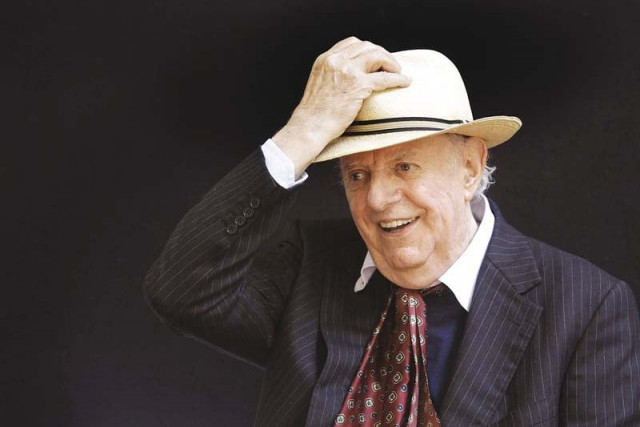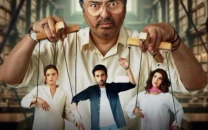How Dario Fo left a lasting impression on Pakistani theatre
Late Italian playwright Dario Fo holds a special place in the hearts of Pakistani theatre enthusiasts

Dario Fo breathed his last on Thursday. PHOTO: FILE
Swerving through disparagers and the establishment alike, Fo managed to create an oeuvre that made him one of the world’s most-produced playwrights. He continued his prolific streak throughout his life, authoring two books and living life as a performer, artist, pamphleteer and an anarchic becoming a veritable nuisance to the Italian establishment.

His most famous plays Accidental Death of an Anarchist, first performed in 1970, and Can’t Pay? Won’t Pay!, performed in 1974, have been adapted all around the world. His plays captured the hearts and minds of ordinary Italians and his rebellious humour made him a cult favourite. Fo was periodically hounded off stage and television in an attempt to muzzle him – but he continued being the nonconformist that he was till the end of his days.
Fo’s plays rooted in an old comic tradition, written to open audience’s eyes to societal injustices, also found their way to Pakistan. In 2008, the LUMS Drama Line society staged an adaptation of Accidental Death of an Anarchist as Marta Kya Na Karta. Saint Patrick’s Dramatics Society also enacted an adaptation titled The Accidental Death of a Mullah for three days at Karachi’s PACC in 2007; the play centered on how government institutions subvert justice by becoming both the judge and jury.
In 2010, his play Can’t Pay? Won’t Pay! was staged in Islamabad, directed by Claire Pamment and localised by her husband Sarmad Sehbai. Indu Mitha was roped in as choreographer with Tariq Amin doing the hair and make-up, along with a couple of Italians doing cameo appearances. Through this play, the writer brought to limelight basic amenities that the labour class is deprived of, in his characteristically lighthearted manner.
Three years later, in 2013, Accidental Death of an Anarchist was also adapted at the National Academy of Performing Arts. Directed by Farhan Alam Siddiqui and adapted by Imran Aslam, the witty and political Lao Tu Qatl Nama Mera was enacted. “This play was also performed in the 1980s during Martial law as a form of resistance to state oppression and enforced disappearances. Accidental Death of an Anarchist was particularly adapted these many times because our tradition has been to question state authority, especially two to three decades ago,” said NAPA artistic director Zain Ahmed.
Ajoka Theatre’s artistic director Madeeha Gohar said, “He is a highly respected playwright as he wrote in the style of satire and irony. He is an inspiration for those of us who believe in political theatre.” Ajoka may not have done a Dario Fo play but Gohar shared that they have been inspired by his work and they might do a play as a tribute to the now deceased icon. “He talked about society, women and his work is easily adaptable into our own situation. In my experience, presenting serious issues in a lighter vein is a good way of communicating with audiences because it makes them laugh but also think about things. That is what Dario Fo and people like Bertolt Brecht mastered,” she added.
For as many as 40 years, Sheema Kermani’s name has been almost synonymous with theatre activism in Pakistan. Under the auspices of her brainchild Tehrik-e-Niswan, a movement for women’s rights awareness, she has done four Dario Fo plays. The-one-woman plays include; Waking Up, A Woman Alone, The Same Old Story and Medea. “His plays, thoughts and ideas on performing arts have really inspired us and helped us find our direction,” she shared. “Classical traditions of Italian drama incorporated with modern political thought – that was his contribution to political theatre in the world. Italians have a lot of emotionalism and are not cold like some other Western countries so we can relate to their humour. I find it concerning that people either become totally sloganish or propagandised or do meaningless comedy. He showed that comedy is not necessarily meaningless,” she said, adding, “He made one laugh and also made one think. He gave thought-provoking comedy to the world.”
Published in The Express Tribune, October 17th, 2016.
Like Life & Style on Facebook, follow @ETLifeandStyle on Twitter for the latest in fashion, gossip and entertainment.



















COMMENTS
Comments are moderated and generally will be posted if they are on-topic and not abusive.
For more information, please see our Comments FAQ